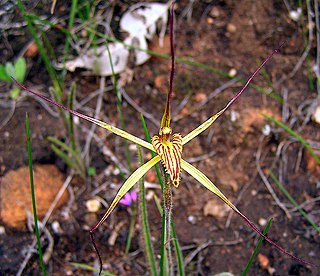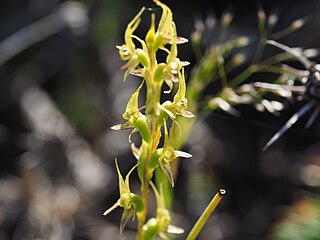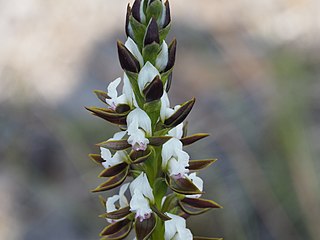
Among the many wildflowers in Western Australia, there are around four hundred species of orchids.

Among the many wildflowers in Western Australia, there are around four hundred species of orchids.
One of the first botanists to study Western Australia was Archibald Menzies, aboard HMS Discovery, who explored King George Sound in 1791. Many of the samples (including orchids) were lost in the return to England, but those that did survive were documented in Prodromus Florae Novae Hollandiae et Insulae Van Diemen , published by Robert Brown in 1810.
The first three orchids from Western Australia to be named were Caladenia menziesii (now Leptoceras menziesii ), Caladenia flava , and Diuris longifolia .
In 1802 Robert Brown himself collected 500 specimens of flora from Western Australia, including:
In West Australian Orchids (1930), Emily Pelloe described and illustrated an extensive survey. She provided an English text, paintings, and drawings for the amateur reader, a mixture of impression and scientific illustration of the genera.

| Common name | Genus | No. species in southwest W.A. | Remarks |
|---|---|---|---|
| Babe-in-a-cradle | Epiblema | 1 | |
| Beard orchids | Calochilus | 6 | |
| Blue orchids | Cyanicula | 11 | |
| Bunny orchids | Eriochilus | 6 | |
| Donkey orchid | Diuris | ~36 | |
| Duck orchids | Paracaleana | 13 | |
| Elbow orchid | Spiculaea | 1 | |
| Enamel orchids | Elythranthera | 2 | |
| Fairy orchid | Pheladenia | 1 | |
| Fire orchids | Pyrorchis | 2 | also Beak orchids |
| Greenhoods | Pterostylis | ~90 | |
| Hammer orchids | Drakaea | 10 | |
| Hare orchid | Leporella | 1 | |
| Helmet orchids | Corybas | 4 | |
| Leafless orchid | Praecoxanthus | 1 | |
| Leek orchids | Prasophyllum | 25 | |
| Mignonette orchids | Microtis | 14 | also Onion orchid |
| Mosquito orchids | Cyrtostylis | 5 | |
| Potato orchids | Gastrodia | 1 | also Bell orchid |
| Pygmy orchid | Corunastylis | 1 | |
| Rabbit orchid | Leptoceras | 1 | |
| Rattle beaks | Lyperanthus | 1 | |
| Slipper orchids | Cryptostylis | 1 | also Tongue orchid |
| South African orchids | Disa bracteata | 1 | introduced |
| Spider orchids | Caladenia | 125 | |
| Sugar orchid | Ericksonella | 1 | |
| Sun orchids | Thelymitra | 37 | |
| Underground orchids | Rhizanthella | 1 |

Leptoceras menziesii, commonly known as rabbit orchid, is a plant in the orchid family, Orchidaceae and the only member of the genus Leptoceras. It is a slender plant, usually found in large colonies and which only flowers after fire. The flowers are small, white, pink and red on a stem up to 30 cm (10 in) tall and is endemic to southern Australia. It was one of the first orchids from Western Australia to be described and was given the name Caladenia menziesii, a name still used by some authorities.
Caladenia elegans, commonly known as the elegant spider orchid, is a species of orchid endemic to a small area near the coast of the south-west of Western Australia. It resembles the common spider orchid and often grows with it but its flowers are a different colour and C. elegans usually grows in poorly-drained soils. Only about 2,300 plants remained in 2016.

Diurideae is a tribe of orchid in the subfamily Orchidoideae. It contains about 40 accepted genera. As of April 2018, its division into subtribes remained unclear.

Diuris longifolia is a species of orchid which is endemic to the south-west of Western Australia. It has a variety of common names including purple pansy orchid, donkey orchid, common donkey orchid and wallflower orchid. It was one of the first three terrestrial orchids to be named from Western Australia, along with Caladenia menziesii and Caladenia flava.
Caladenia abbreviata, commonly known as the coastal spider orchid, is a plant in the orchid family Orchidaceae and is endemic to the south-west of Western Australia. It has a single erect, hairy leaf and up to three pale, creamy-yellow flowers on a flowering stem up to 35 cm (10 in) high. Although the flowers have long, thread-like petals and sepals, they are shorter and darker than those of other spider orchids. It is a rare, relatively recently discovered species although often found near human activities.

Caladenia caesarea subsp. caesarea, commonly known as the mustard spider orchid, is a plant in the orchid family Orchidaceae and is endemic to the south-west of Western Australia. It has a single spreading, hairy leaf and up to three mustard-coloured flowers with red stripes. It was originally described as a subspecies of Caladenia filamentosa but the rich colour of its flowers and prominent labellum separate it from that species.

Caladenia caesarea subsp. maritima, commonly known as the cape spider orchid, is a plant in the orchid family Orchidaceae and is endemic to the south-west of Western Australia. It has a single spreading, hairy leaf and up to three small mustard-coloured flowers with red stripes. It is only known from a small coastal area near Cape Leeuwin where it grows in clumps of ten or more.
Caladenia caesarea subsp. transiens, commonly known as the dwarf mustard spider orchid, is a plant in the orchid family Orchidaceae and is endemic to the south-west of Western Australia. It has a single spreading, hairy leaf and up to three small lemon-yellow flowers with red stripes. It is only known from a single small population near the town of Williams.
Caladenia heberleana, commonly known as Heberle's spider orchid, is a species of orchid endemic to the south-west of Western Australia. It has a single, hairy leaf and up to three red, white and pale yellow flowers which have a white, red-tipped labellum.
Caladenia winfieldii, commonly known as the majestic spider orchid, is a species of orchid endemic to the south-west of Western Australia. It is a rare species with a single erect, hairy leaf and one or two bright pink flowers and grows in only two seasonally wet locations, a few hundred metres apart.

Prasophyllum gracile, commonly known as the little laughing leek orchid, is a species of orchid endemic to the south-west of Western Australia. It is one of the most common and widespread orchids in the south-west and has a single smooth, tube-shaped leaf and up to forty or more, usually yellowish-green flowers.

Prasophyllum sargentii, commonly known as the frilled leek orchid, is a species of orchid endemic to the south-west of Western Australia. It is a tall orchid with a single smooth, tubular leaf and up to thirty or more purplish and white or golden brown and white flowers with a frilled labellum.
Prasophyllum paulinae, commonly known as Pauline's leek orchid, is a species of orchid endemic to the south-west of Western Australia. It is a small, rare leek orchid with a single smooth, tubular leaf and up to seventy yellowish-green and purple flowers.
Diuris emarginata, commonly called the late donkey orchid, is a species of orchid which is endemic to the south-west of Western Australia. It has up to six leaves and a flowering stem with up to eight yellow flowers with brown markings but only after fires the previous summer.
Diuris heberlei, commonly called Heberle's donkey orchid, is a species of orchid which is endemic to the south-west of Western Australia. It has three to five linear leaves at its base and up to four bright yellow flowers with a reddish brown border around the labellum callus. It is found along the south coast and is one of the last Diuris to flower in Western Australia.

Thelymitra apiculata, commonly called Cleopatra's needles, is a species of orchid in the family Orchidaceae and endemic to the south-west of Western Australia. It has a single erect, curved, dark green leaf with a purplish base and up to twelve purplish flowers with darker blotches and golden yellow edges. There are two yellow arms on the sides of the column, each ending with a needle-like point.
Robert J. "Rob" Bates is an Australian botanist, plant collector, and illustrator.

Caladenia caesarea is a species of flowering plant in the orchid family Orchidaceae and is endemic to the south-west of Western Australia. It is a ground orchid with a single erect, hairy leaf and up to three mustard-coloured or lemon-yellow flowers.

Caladenia exilis is a species of flowering plant in the orchid family Orchidaceae and is endemic to the south-west of Western Australia. It is a ground orchid with a single erect, linear leaf and up to three white to greenish-cream or dark pinkish-maroon flowers.

{{cite book}}: CS1 maint: multiple names: authors list (link)